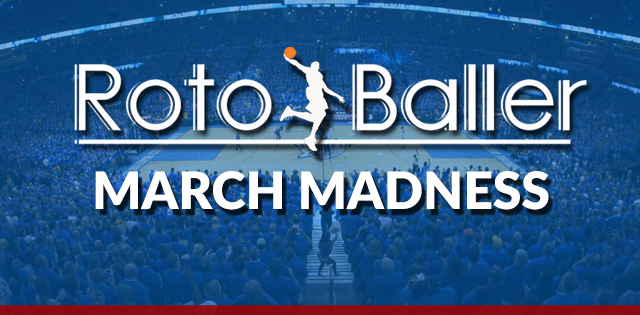
NCAA college basketball expert Seth Finkelstein's guide on how to fill out your tournament bracket for the 2022 college basketball tournament. See what advice Seth gives to help you prepare for March Madness.
What's up RotoBallers! March Madness is officially here, and RotoBaller will be bringing you a full breakdown of the NCAA tournament. After you're done here, be sure to check out the rest of our NCAA tournament columns and advice including tournament winners/picks, sleepers, busts and breakdowns of each region.
I'm here to give you a tournament strategy guide - important things to know before filling out your brackets. Now, everyone's a genius this time of year. I love listening to people rave about a team like Vermont. Everyone thinks they know so much despite not watching more than a dozen games all year and only reading one article on ESPN.
The NCAA Tournament is fully back in its original form. Last year it was all held in the Indianapolis region. This year, it'll be played all throughout the country. I also have columns breaking down each region (West, East, South, and Midwest).
A Checklist Before Filling Out Your Bracket
- Check the spreads, not the seeds. Here are some examples of games where the spreads are a lot closer than you'd think based on the seeds. No. 4 Providence only a two-point favorite against No. 13 South Dakota State. No. 4 Arkansas is a 5.5 point favorite against No. 13 Vermont. No. 6 Texas is -1.5 against No. 11 Virginia Tech. And No. 11 Michigan -2.5 against No. 6 Colorado State.
- Go contrarian. Last year, Illinois was the hottest team. They were the second-most-picked team to win the title, behind Gonzaga. They lost in the second round to No. 8 Loyola Chicago.
- Teams are entirely different come March than they were in December. Weigh recent games more than a game in December.
- Check the rules for your pool. Are there upset points? Are first-round games weighted as evenly as Elite Eight games? Pools have their own rules. Make sure you know them.
- And finally, the most important rule, DO NOT TINKER! The more you second-guess yourself, the more you'll regret it.
Does Conference Tournament Success Equal NCAA Tournament Success?
The answer is no.
Fivethirtyeight.com posed this question several years ago. They looked at data dating back to 1985. It's complicated and if you really care to find out the process and how they came to their conclusion, you can read it here. Here is the main point of their findings,
"This analysis does serve as a warning against putting too much emphasis on the conference tournament relative to a team’s entire body of work, especially when it comes to picking unexpectedly hot conference tournament teams to go further than you’d otherwise predict for teams with their résumés."
Conference tournaments are just another cash grab for the schools.
What's the Magic to Winning It All?
- A veteran team. Look at the last five champions; Baylor, Virginia, Villanova, North Carolina, and Villanova again. Those teams had upper-classmen who had been in plenty of big games before and knew how to get it done in the big moments.
- An NBA point guard.
- A rim protector.
- A team with a solid offense, but more importantly one that can get stops when it needs to.
- Ken Pomeroy is a college basketball wizard. He has advanced stats for every team on his website, kenpom.com. Since 2002, each team to win the title except for one, was ranked top-20 in both offensive and defensive efficiency. Those teams this year are Gonzaga, Arizona, Houston, Baylor, and UCLA.
Championship Pick
Gonzaga. Hate to be chalk, but this is the best team with a fairly easy road to the Final Four.
Enjoy the games, and good luck to all!
More March Madness Analysis
 RADIO
RADIO
























